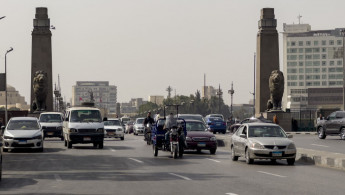Breadcrumb
'Uber driver tried to kidnap me': Egyptian woman in coma after reportedly escaping horrific fate
Ride-hailing apps may no longer be a safe option for female riders in Egypt, whose capital has once been ranked as "the world's most dangerous megacity for women."
Last week, a shocking incident sent shockwaves across the North African country when a 24-year-old woman jumped from a fast-moving car on a dangerous highway on the outskirts of Cairo to reportedly escape a horrific fate.
"The Uber driver attempted to kidnap me," the woman, named Habiba El-Shamaa, told a witness who rushed to help her on Wednesday evening, 21 February, after she had fallen and hit a cement barrier.
"These were her only words as she vomited…had seizures… and then lost consciousness before being rushed to the nearby hospital," the witness told the victim's friends when he picked up her mobile phone.
The driver fled the scene and never stopped to assist the victim, according to the statements given by the same witness before the authorities.
Shamaa has sustained critical injuries, including bone fractures, internal bleeding, and brain haemorrhage, and has been in a coma ever since.
Shamaa's mother told talk show host Amr Adeeb in a phone interview on Sunday evening with MBC Misr TV that she spoke to her daughter once the latter got into the car but could not hear her well due to loud music.
The mother said she overheard the driver shouting at someone on the phone. She asked her daughter to leave the car after she heard her saying unclear words, but Shmaa told her mother she would check in after she arrived.
An Uber Egypt spokesperson, meanwhile, expressed the company's sorrow towards the situation and that it has been cooperating with the authorities to ensure all necessary measures.
"An incident response team has been in touch with the rider's family," the spokesman told local Cairo 24. The news outlet did not name the company representative, though.
However, the victim's mother, Dina Omar, denied in statements to Adeeb that any Uber representative has ever reached out to the family.
Earlier on Saturday, 24 February, the Ministry of Interior said in an official statement that the incident had been under investigation, and the driver had been arrested, questioned and remanded in custody pending further investigations.
During interrogation, the driver denied all accusations, claiming he was surprised when Shamaa suddenly jumped out of the car, the statement read.
The driver further alleged he ended the trip on the application, fleeing the scene for fear of getting in trouble.
The Interior Ministry added that the driver had a previous criminal record without elaborating further.
Meanwhile, the horrific incident prompted President Abdel Fattah El-Sisi to reach out to Shamaa's family, offering support and medical treatment abroad if needed, local news outlets reported.
In November last year, the Egyptian parliament approved new government-drafted amendments to the penal code, hardening penalties for sexual harassment and bullying crimes.
If a sexual harassment crime is committed against a woman at the workplace or in public transportation, the perpetrator is sentenced to no less than three years in prison and ordered to pay 300,000 Egyptian pounds (amounting to around US$9,700).
The jail term is increased from 5 years up to 10 years if the perpetrator has authority or is the guardian of the female victim.
Incidents of sexual harassment, whether verbal or physical, are common in Egypt. It was not until 2008 when a Cairo court sentenced a man to three years in prison in the first-ever verdict against sexual harassment of a woman in Egypt's judicial history.
In recent years, women across Egypt have spoken out on social media about the subject as part of the #MeToo movement, as many went public and reported such atrocities.
Statistically, around 7.8 million Egyptian women undergo a form of gender-based violence every year, according to a UN survey released in 2015.






![Anthony Blinken speech [Getty] Anthony Blinken speech [Getty]](/sites/default/files/styles/image_684x385/public/media/images/6263436E-8ACD-4D3C-9055-25A7BE79DD5A.jpg?h=d1cb525d&itok=fLHmHCRG)
 Follow the Middle East's top stories in English at The New Arab on Google News
Follow the Middle East's top stories in English at The New Arab on Google News
![Gaza death toll [Getty]](/sites/default/files/styles/image_330x185/public/2192491071.jpeg?h=a5f2f23a&itok=1V9vL9X5)
![Koutoubia Mosque, Marrakech [Getty/file photo]](/sites/default/files/styles/image_330x185/public/599585491.jpeg?h=ccb8d0fb&itok=Ov05vBAW)
![Italy FM Tajani [Getty]](/sites/default/files/styles/image_330x185/public/2192496012.jpeg?h=a5f2f23a&itok=W1iS7P4X)